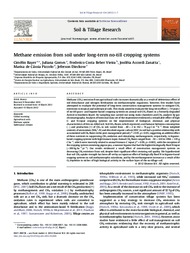Methane emission from soil under long-term no-till cropping systems.
Methane emission from soil under long-term no-till cropping systems.
Summary: Methane (CH4) emission from agricultural soils increases dramatically as a result of deleterious effect of soil disturbance and nitrogen fertilization on methanotrophic organisms; however, few studies have attempted to evaluate the potential of long-term conservation management systems to mitigate CH4 emissions in tropical and subtropical soils. This study aimed to evaluate the long-term effect (>19 years) of no-till grass- and legume-based cropping systems on annual soil CH4 fluxes in a formerly degraded Acrisol in Southern Brazil. Air sampling was carried out using static chambers and CH4 analysis by gas chromatography. Analysis of historical data set of the experiment evidenced a remarkable effect of high C- and N-input cropping systems on the improvement of biological, chemical, and physical characteristics of this no-tilled soil. Soil CH4 fluxes, which represent a net balance between consumption () and production (+) of CH4 in soil, varied from 40 2 to +62 78 mg C m2 h1. Mean weighted contents of ammonium (NH4+–N) and dissolved organic carbon (DOC) in soil had a positive relationship with accumulated soil CH4 fluxes in the post-management period (r2 = 0.95, p = 0.05), suggesting an additive effect of these nutrients in suppressing CH4 oxidation and stimulating methanogenesis, respectively, in legumebased cropping systems with high biomass input. Annual CH4 fluxes ranged from 50 610 to +994 105 g C ha1, which were inversely related to annual biomass-C input (r2 = 0.99, p = 0.003), with the exception of the cropping system containing pigeon pea, a summer legume that had the highest biologically fixed N input (>300 kg ha1 yr1). Our results evidenced a small effect of conservation management systems on decreasing CH4 emissions from soil, despite their significant effect restoring soil quality. We hypothesized that soil CH4 uptake strength has been off-set by an injurious effect of biologically fixed N in legume-based cropping systems on soil methanotrophic microbiota, and by the methanogenesis increase as a result of the O2 depletion in niches of high biological activity in the surface layer of the no-tillage soil.
Publication year: 2012
Types of publication: Journal article
Unit: Embrapa Forestry
Observation
Some of Embrapa's publications are published as ePub files. To read them, use or download one of the following free software options to your computer or mobile device. Android: Google Play Books; IOS: iBooks; Windows and Linux: Calibre.
Access other publications
Access the Agricultural Research Database (BDPA) to consult Embrapa's full library collection and records.
Visit Embrapa Bookstore to purchase books and other publications sold by Embrapa.

